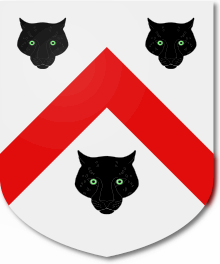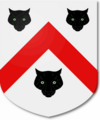Richard Farington facts for kids
Quick facts for kids Farington baronets |
|
|---|---|

Escutcheon of the Farington baronets of Chichester
|
|
| Creation date | 1697 |
| Status | extinct |
| Extinction date | 1719 |
Sir Richard Farington, 1st Baronet (born around 1644 – died 7 August 1719) was an English politician. He was a member of the Whig Party, a political group in England at the time. Sir Richard served in the English House of Commons from 1681 to 1701. Later, he was also a member of the British House of Commons between 1708 and 1719.
Contents
Sir Richard's Early Life
Richard Farington was the son of Sir John Farington and Ann May. His mother's family was from Rawmere in Sussex, England. In 1687, Richard married Elizabeth Peachey. Her family lived in Ertham.
Becoming a Member of Parliament
Sir Richard Farington followed in his father's footsteps. His father, Sir John, was also a Member of Parliament (MP). An MP is a person elected to represent an area in the country's main law-making body.
In 1681, Richard was elected as an MP for Chichester. This happened during a special election called a by-election. He was elected again later that same year. He served as an MP until 1685.
Important Roles and Titles
Richard Farington held several important jobs in his local area. From 1679 to 1680, he helped collect taxes in Sussex. He also became a Justice of the Peace in 1688. This role meant he helped keep law and order.
In 1696, he was chosen as the High Sheriff of Sussex. This was a very important position for one year. By 1697, he was a captain in the local army group, known as the militia, in Chichester.
In December 1697, Sir Richard Farington was given a special title. He became a baronet. A baronet is a person who has a hereditary title, meaning it can be passed down in the family. This title was "of Chichester in the County of Sussex."
His Time in Parliament
After becoming a baronet, Sir Richard was re-elected as an MP for Chichester in 1698. He did not run in the first election of 1701. He tried again in the second election that year but did not win.
He was elected again in 1708 and 1710. However, he lost the election in 1713. In 1715, he was elected once more as a Whig MP for Chichester. He continued to support the government until he passed away.
The End of the Baronetcy
Sir Richard Farington died in Bath in August 1719. He had three sons, but sadly, all of them died before him. Because he had no living sons to inherit his title, the baronetcy ended when he died.
Images for kids
 | Charles R. Drew |
 | Benjamin Banneker |
 | Jane C. Wright |
 | Roger Arliner Young |


